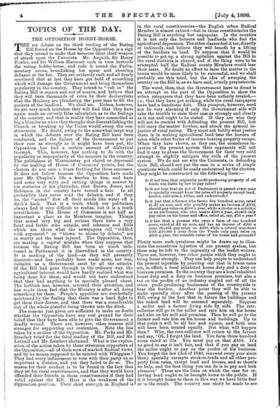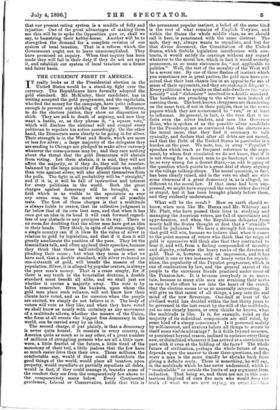TOPICS OF THE DAY.
THE OPPOSITION HOBBY-HORSE. THE set debate on the third reading of the Rating Bill forced on the House by the Opposition is a sign that they intend to make that measure their chief weapon of attack upon the Unionists. Mr. Asquith, Sir Henry Fowler, and Sir William Harcourt each in turn bestrode the rating hobby-horse, and rode it round the Parlia- mentary arena, brandishing his spear and shouting defiance at the foe. They are evidently each and all firmly convinced that at last they have got hold of something which will damage the Government and bring themselves popularity in the country. They intend to "rub in" the Rating Bill in season and out of season, and believe that they will turn thousands of votes by their declarations that the Ministry are plundering the poor man to fill the pockets of the landlord. We shall see. Unless, however, we are very much mistaken they will find that they have again made an entirely false calculation as to the feelings of the country, and that in reality they have committed as big a blunder as when they thought that disestablishing the Church or breaking up the Union would sweep the con- stituencies. No doubt, owing to the somewhat inept way in which the debates over the Rating Bill have been conducted, and the failure of the Government to put their case as strongly as it might have been put, the Opposition has had a certain amount of dialectical triumph. This, however, has nothing to do with the popularity or unpopularity of the measure in the country. The politicians at Westminster get elated or depressed by the making of House of Commons' points, but the electors do not care a brass farthing for these successes. It does not follow because the Opposition have made poor Mr. Chaplin's life a burden to him, and have said some very witty and cutting things in answer to his statistics or his platitudes, that Brown, Jones, and Robinson in the country have turned a hair. In all probability they never read the debates, and if they do, the "scores" flow off their minds like water off a duck's back. That is a truth which our politicians always find it very difficult to realise, but it is a truth nevertheless. The House of Commons is not half as important a place as its Members imagine. Things that sound very big and serious there have a very faint and feeble echo outside, and schemes and Bills which are there what the newspapers call "riddled with argument" or "blown to atoms by debate," are in reality not the least injured. The Opposition, then, are making a capital mistake when they suppose that because the Rating Bill has been so much talk- tossed in Parliament it is discredited in the country. It is nothing of the kind—as they will presently discover—and has probably been made more, not less, valuable as a Government asset by all the attacks. If the Bill had gone through in the ordinary way, the agricultural interest would have hardly realised what was being done for them, and would not have understood that they had anything to be specially pleased about. The hubbub has, however, arrested their attention, and has made them feel that the Ministry is after all doing something for them. People's appetites are wonderfully quickened by the feeling that there was a hard fight to get them their dinner, and that there was a considerable risk of the whole plateful being thrown into the ditch. The reasons just given are sufficient to make us doubt whether the Opposition have any real ground for their belief that they have been able to give the Government a deadly wound. There are, however, other reasons still stronger for supporting our contention. Note the line taken by a section of the Opposition. Mr. Perks and Mr. Strachey voted for the third reading of the Bill, and Mr. Luttrell and Mr. Lambert abstained. What is the explan- ation of the action taken by these strenuous supporters of the Opposition,—all of them men of marked Radical views, and by no means supposed to be tainted with Whiggism ? They had every inducement to vote with their party on so important a division, and yet they failed to do so. The reason for their conduct is to be found in the fact that they sit for rural constituencies, and that they would have offended their friends in those constituencies if they had voted against the Bill. Here is the weakness of the Opposition position. Their chief strergth in England is in the rural constituencies—the English urban Radical Member is almost extinct—but in those constituencies the Rating Bill is anything but unpopular. In the counties it is not only the farmers and landlords who feel the agricultural depression. The other classes feel it too, directly or indirectly, and believe they will benefit by a lifting of the burdens on land. To suppose that it would be possible to get up a strong agitation against the Bill in the rural districts is absurd, and if the thing were to be attempted half the Radical county Members would lose their seats. No doubt an effort to raise the matter in the towns would be more likely to be successful, and we shall probably see this tried, but the idea of sweeping the country on the Bill is, as we have said, utterly preposterous.
The worst, then, that the Government have to dread is an attempt on the part of the Opposition to show the urban ratepayers that they have been unfairly treated,- i.e., that they have got nothing, while the rural ratepayers have had a handsome dole. This prospect, however, need not be very alarming if only the Government side will take the trouble to state their case as strongly and clearly as it can and ought to be stated. If they are wise they will not be content with defending the present Bill, but will carry the matter further, and attack the general in- justice of rural rating. They must ask boldly what justice there is in making agricultural land bear the burden of rates while other forms of income-bearing property escape. When they have shown, as they can, the monstrous in- justice of the present system their opponents will not find it easy to abuse the Government for their very mild attempt to slightly mitigate the evils of the present system. We do not see why the Unionists, in defending their Bill, should not put the case in a series of simple questions which could be easily understood by the electors. They might be constructed on the following lines:— is it not true that originally profit-producing property of all kinds was liable by law to pay rates ?
Is it not true that an Act of Parliament is passed every year to specially exempt from the rates all property except land, houses, coal-mines, tithes, and underwoods ?
Is it just that a farmer who farms five hundred acres, rated at £1 an acre, and who possibly makes an income of £500, should pay rates on £500 a year, while a doctor or a solicitor or an auctioneer, who also makes £500 a year, should only pay rates on his house and office, rated at, say, £50 a year ?
Is it fair that a yeoman who owns a farm of one hundred acres, rated at £2 an acre, and has an income of .£200 a year, should pay rates on £200, while a retired merchant with £20,000 a year from the Funds only pays rates on £200 a year, the rateable value of his house and grounds ?
Plenty more such questions might be drawn up to illus- trate the monstrous injustice of our present system, but these may be left to the ingenuity of the leaflet writers. There are, however, two other points which they ought to bring home strongly. They can help people to understand the present injustice by pointing out that in towns rates are, in effect, a local inhabited house duty and a duty or business premises. In the country they are a local inhabited house duty and a duty on business premises, but also a tax on the profits of an industry singled out of all the other profit-producing businesses of the countryside to bear the burden. Another point they will be able to make specially clear after the passing of the present Bill, owing to the fact that in future the buildings and the naked land will be assessed separately. Suppose a miller and a farmer living side by side. The rate- collector will go to the miller and rate him on his house and also on his mill and premises. Then he will go to the farmer and rate him on his house and buildings. Up to that point it will be all fair and square, and both men will have been treated equally. But what will happen then ? Why, the rate-collector will return to the farmer and say, 'Oh, I forgot the land. You farm three hundred acres rated at 30s. You must pay on that .£450. It's no good to say it isn't fair, and that if you pay on land the miller ought to pay on the profits of his business. You forget the law (Act of 1840, renewed every year since then) specially exempts stock-in-trade and all other pro- perty from rates, except land and houses, and so there's no help, and the best thing you can do is to pay and look pleasant.' These are the lines on which the case for re- lieving land ought to be brought home to the public. If it is brought home to them in this way we have little fear as '_o the result. The country can easily be made to see that our present rating system is a muddle of folly and injustice. One of the great advantages of making them see this will be to spike the Opposition gun or, shall we say, to hamstring their hobby-horse. Another will be to strengthen the demand for a complete revision of our system of local taxation. That is a reform which the Government ought not to leave unaccomplished. They have promised an inquiry. When that inquiry has been made they will fail in their duty if they do not act upon it, and, establish our system of local taxation on a firmer and fairer basis.











































 Previous page
Previous page